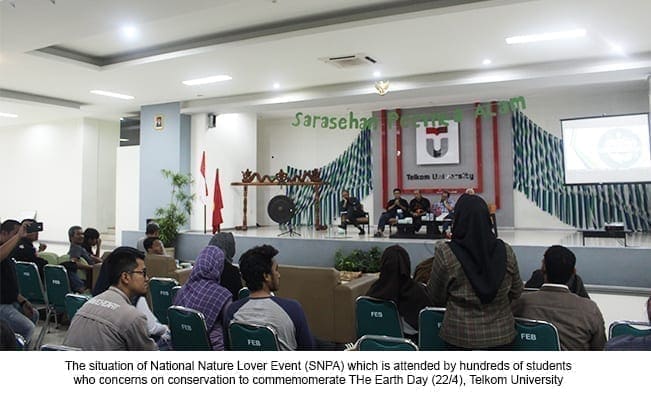Bandung – Hundreds of students and community of conservation activists from various regions converged at Manterawu Building Telkom University in the National Nature Lovers Association (SNPA), the event as well as a solemn reflection in commemoration of Earth Day on April 22 every year.
“One of the objectives of this activity is to provide an understanding on the current endangered ecosystem especially on the Java Island. This event is presented to nature lovers and environment conservationists in order to establish a synergistic and sustainable cooperation in the role of saving and restoring the ecosystem” explained Chief Executive, Niken Galuh Ramadhani, Wednesday (26/4).
Niken explained, SNPA is an activity that will be organized regularly by Astacala, students of nature lovers association Telkom University. Originated from the idea of reunion of members of Tiger Expedition Java which was done 20 years ago.
Through the theme of “Nature Lovers Saving and Restoring Ecosystems of Java Island”, it is expected to arise the consciousness of nature lovers to immediately formulate concrete ideas that can be realized in saving and restoring the ecosystem. Niken mentioned the activities of nature lover consisting of several series, such as panel discussions, workshops and documentary film screenings, which lasted from 09:00 to 20:00 pm.
In the panel discussion session Astacala presented speakers from the Directorate of Prevention of Regional Environmental Impacts and Sector Policy (PDLKWS), Wahyu Giri as one of the researchers in Java Tiger Expedition Rosdi Bahtiar Martadi from Banyuwangi’s Forum for Environmental Learning (BaFFEL) and Eko Teguh Paripurno as Presidium The Indonesian Society for Disaster Management (MPBI), and moderator by Siti Maimunah who is a former National Coordinator of JATAM and a researcher from Sajogyo Institute.
First speaker by Sasmita Nugroho of PDLKWS, he presented the current situation of Javanese ecosystems that are in fact no longer suitable for occupancy based on a hydrological approach. “The availability of water in Java is very lame between the needs and availability” explained Sasmita Nugroho.
Furthermore, Wahyu Giri or familiarly called Cak Giri, explained the important role of carnivore as the top of the food chain in maintaining the sustainability of the ecosystem. He recounted his experience struggling with the Java Tiger Expedition team to prove the existence of Java Tiger (panthera tigris sondaica) which was declared extinct by WWF in 1996.
In addition, He also added that there are indications of a mistake in declaring the extinction of Java Tiger. “A species is declared extinct if he is not found for 2 times the amount of his life with intensive research” said Wahyu Giri added.
According to him, Java Tiger which has a life span of up to 25 years, takes 50 years to be declared extinct. The last recorded Javanese tiger, based on Steidensticker & Soejono’s research, was in 1976. That means in 2026 the new Javanese tiger deserves to be declared extinct.
Meanwhile, Rosdi Bahtiar Martadi also added how when a rare species is declared extinct in a conservation area, the government can easily reduce the status of the area into a production area. As happened in Tumpang Pitu today, the area 4 km from Meru Betiri National Park (TNMB) is experiencing a chaos regarding the plan to open the gold mining area.
“Whereas in the AMDAL study it is stated that the area of Tumpang Pitu in there is a habitat for the Leopard of Java which its status is now threatened,” said Rosdi Bahtiar Martadi.
On the other hand, Eko Teguh Paripurno describeed lately the urgency of humans to meet the needs of making human beings more intensively exploit nature. The principle of harmony and equilibrium is abandoned. “And, we, nature lovers, whether we realize it or not, have long ago understood the need for the necessity of natural harmony and environmental harmony,” he concluded.

